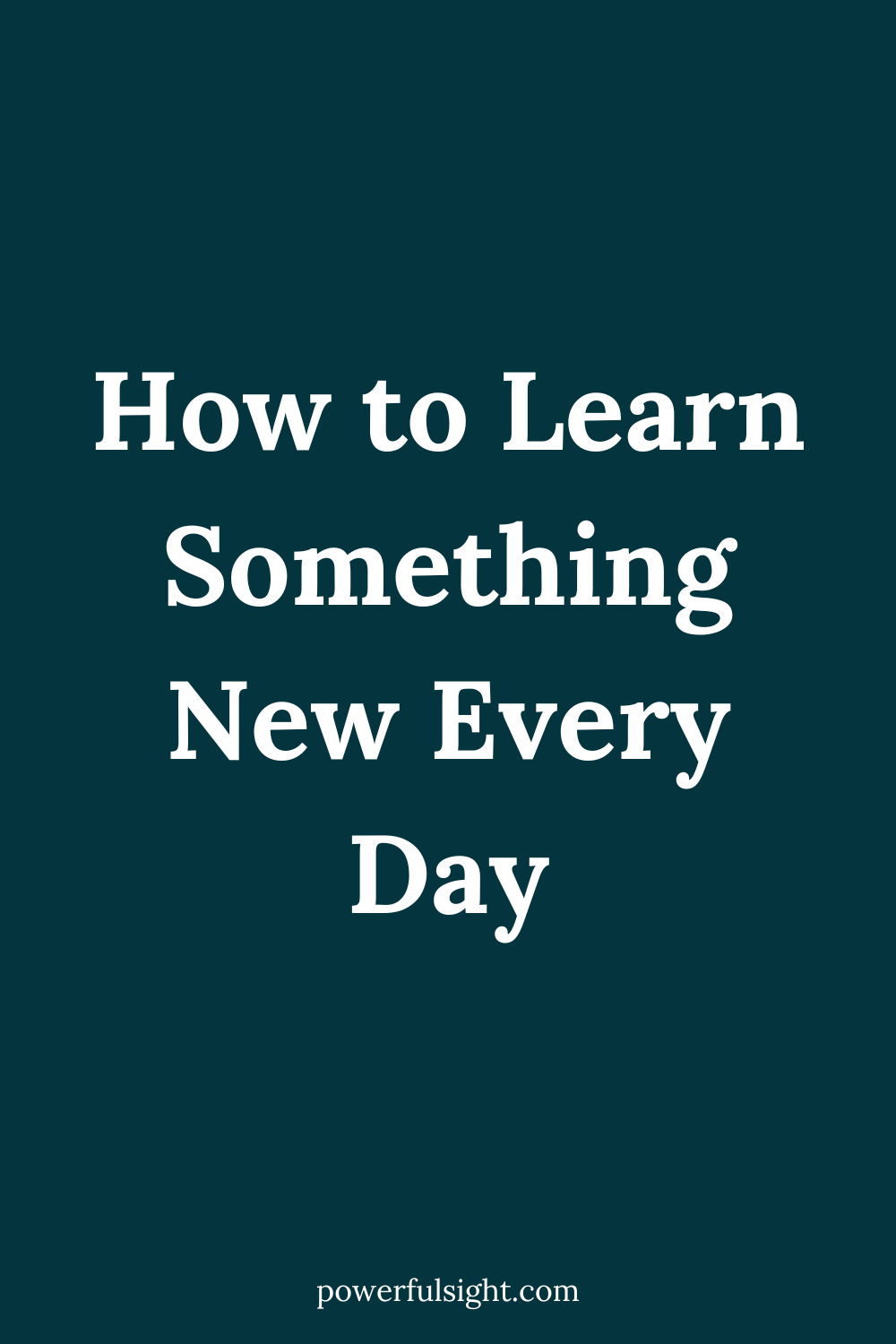You have the power of curiosity in your hands. It all starts in your mind first thing in the morning. Be curious and decide to learn even one thing, and you have already set yourself on the road to becoming a person who grows constantly—every day, every year, for as long as you live.
The world changes every second. Learning one new thing each day keeps you alive, informed, and, above all, amazed. It is a small act, a habit, a lifestyle that keeps your mind agile, your spirit supple, and your life rich.
It is not easy, in a day already brimming with other tasks, to commit to the conscious act of learning. There is no need for classrooms, books of hundreds of pages, or full schedules of lessons.
The principle is already there; we simply have to find it. What is needed is first awareness, then will, and finally strategy. It is not about studying; it is about changing focus, taking advantage of opportunities, and treating life as a continuous path of learning.
To begin with, here are 13 tips for learning one new thing every day, freely and naturally.

How to Learn Something New Every Day
1) Change Your Focus—from “Learning” to “Curiosity”
Learning can happen in countless ways: through a formal conversation, a mistake, a book, a documentary, or even a simple quote. It can come from careful observation while waiting for your coffee or sitting at a traffic light.
Redefine what learning means to you. It is not only about studying; it is about learning to notice. Once you start using this new definition, you begin to see that you can learn something every day. It may be how your colleague handles stress, a new route home from work, or the realization that you were wrong about something.
Learning one new thing every day becomes possible simply by shifting your focus—just a little—from “learning” to “curiosity.”
Related: 100 Best Self Improvement Books To Read
2) Curiosity Is a Habit
Learning begins with a question—with that small spark of curiosity that pushes you to wonder how or why something happens.
A curious person never takes anything for granted. When they see how something works, they immediately ask a thousand questions about why it is that way and what would happen if it were different.
You can begin the habit of learning something new each day by choosing one question every morning. For example:
-
“How does the brain store memories?”
-
“Why do leaves change color?”
-
“What makes people good at public speaking?”
Five minutes later, you may already have your answer—by looking something up, watching a short video, or asking a friend who knows. The time required is often very little.
The only thing that truly matters is to stay open. You begin learning again the moment you stop thinking you already know it all.
Related: 8 Proven Ways to Improve Your Vocabulary
3) Start a Learning Journal
One of the best ways to make learning a daily habit is to write down what you discover. A learning journal does not need to be long or strictly kept every day. It can simply contain a few notes about what caught your attention.
For example:
-
“Learned that honey never spoils.”
-
“Watched a video on how to improve focus.”
-
“Discovered that empathy and listening are stronger leadership skills than authority.”
At the end of the week, look back at your notes. You will notice recurring themes—what interests you, what habits you are trying, and what questions remain open. Over time, this small routine becomes a map of your personal growth.
Related: 10 Bad Habits To Break To Improve Your Life This Year
4) Read a Little Every Day
Books are one of the simplest and most reliable ways to learn new things. Of course, it is not always possible to read a whole book daily, but ten pages—or even one thoughtful article—can make a difference.
Treat reading as you would a balanced diet. Read about topics that interest you, but also explore others—psychology, art, science, or philosophy. The best ideas often appear where different disciplines meet.
If you are short on time, audiobooks and podcasts are excellent alternatives. The format does not matter; what matters is staying in touch with ideas that expand and challenge your thinking.
Related: How to Improve Your Life And Become A Better Person
5) Learn from People, Not Just Sources
Every person you meet knows something you do not. Every conversation can become an opportunity to learn, not just to pass the time.
Ask people about their work, their challenges, and what they have learned from experience. Most are glad to share when they sense genuine curiosity.
Lessons can appear in many forms: a taxi driver’s story, an older neighbor’s advice, or a friend’s different perspective. The sum of these interactions can be far more enlightening than you expect. And if you are fortunate enough to have curious, motivated, and thoughtful people around you, your chances of learning multiply.
Related: How To Improve Communication Skills
6) Learn Wisely with Technology
The internet can be both a great distraction and a great source of knowledge. Used wisely, it allows you to learn almost anything—often for free. Used poorly, it consumes hours while teaching nothing.
To make the most of it:
-
Subscribe to educational YouTube channels or podcasts that genuinely interest you.
-
Try learning apps such as Duolingo, Coursera, or Khan Academy.
-
Subscribe to newsletters that deliver short, useful lessons each day.
The key is always intention. Before you reach for your phone, ask yourself: “Am I about to consume, or am I about to learn?” That single question can save hours of unproductive scrolling.
7) Reflect on What You Learn
Learning is not just the accumulation of information—it is the process of understanding and connecting ideas. At the end of each day, take a few minutes to reflect on what interested you most. How does it fit into your life? Could it solve a problem, shift an opinion, or help someone else?
Reflection turns information into understanding. It allows learning to become part of who you are.
You can reflect in many ways—during an evening walk, while journaling, or before sleep. Ask yourself:
-
“What did I learn today?”
-
“Why does it matter?”
-
“How can I apply it?”
Even one lesson, deeply reflected upon, can shape your perspective over time.
8) Accept Failure as a Part of Learning
The fear of failure or appearing inexperienced often stops people from learning new things. To avoid feeling foolish, many stay silent rather than risk trying.
But if learning is part of your life, mistakes must be as well. When you experiment with something new, errors are inevitable. You will choose wrongly, fail occasionally—but that is how you learn best.
Learning something new every day means becoming comfortable with being imperfect.
9) Teach What You Learn
Teaching is one of the most effective ways to deepen your understanding. When you explain something, you quickly see how well you grasp it.
You do not need to be an expert to share your knowledge. Summarize what you have learned, tell a friend about an article, or share your discovery online. Each time you explain something, you reinforce it in your mind—and invite others to teach you in return.
10) Be Patient and Consistent
A common misunderstanding about learning is that it must happen in great leaps. In truth, growth is gradual. Some days you may read more or explore deeply; other days, noticing one small thing is enough.
The key is continuity. Ten minutes of focused curiosity every day adds up to more than thirty hours of learning in a year—and to a wiser version of yourself.
There will be days when you feel tired or distracted. On those days, keep it light: listen to a short talk, read a quote, or simply observe something more carefully. Learning is not a race but a rhythm.
11) Apply What You Learn
Curiosity must lead to action. Knowledge only becomes valuable when it is used. So, as you learn, begin to apply your discoveries, even in small ways.
If you read about productivity, test one new method that week. If you learn a cooking technique, try it at dinner. If you study a historical event, connect it to what is happening today.
The more you apply what you learn, the more it becomes real. Through practice, understanding deepens and memory strengthens.
12) Protect Your Mind from Overload
In a world overflowing with information, it is easy to feel overwhelmed. It is impossible—and unnecessary—to try to learn everything.
Focus on quality over quantity. Choose what aligns with your goals, values, or genuine interests, and ignore the rest.
Also, know when to pause. Rest allows your mind to process and organize new information, forming meaningful connections. Relaxation, meditation, or simple quiet time are not breaks from learning—they are part of it.
13) Appreciate the Journey
Learning something new every day is not about chasing perfection or collecting facts for pride. It is about staying awake to life—becoming wiser, humbler, and more capable of understanding the ever-changing world and the people in it.
When you treat learning as a daily practice, every day gains depth and color. You begin to see connections where none seemed to exist, understand yourself better, and face challenges with calm confidence. Each small idea becomes a thread woven into the fabric of who you are becoming.
Conclusion
You do not need more hours in the day to learn something new—you only need intention.
You can start right now, from where you are, with what you have. Ask a question, read a page, listen carefully, or simply notice something you have overlooked.
Knowledge is everywhere; it is only a matter of being willing to look for it.
When you decide to learn something new every day, you do not merely collect information—you grow. You adapt. You stay alive and alert to the world around you.
And that, in the end, is the kind of learning that never stops.
Save pin for later.

- 90 Truth Or Dare Questions For Kids - 03/01/2026
- Best Divorce Attorney in the US With Free Consultation - 03/01/2026
- 200 Things to Do with Your Boyfriend at Home in 2026 - 03/01/2026
